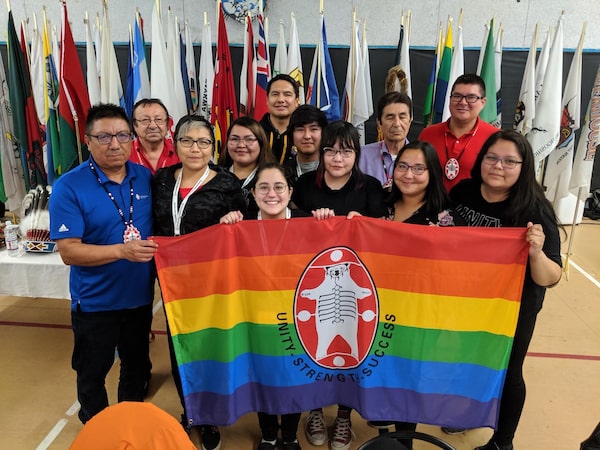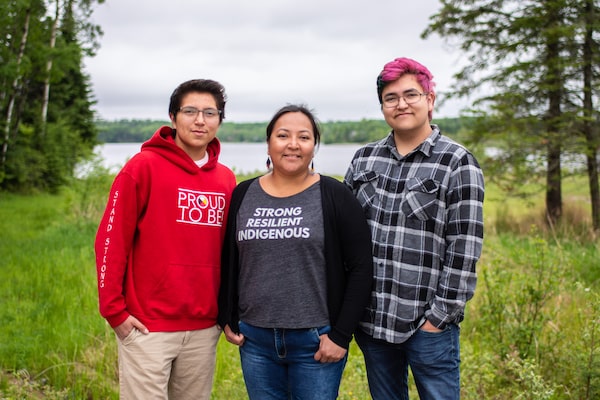
Youth from Northwestern Ontario unveiled the Nishnawbe Aski Nation (NAN) Pride flag to 49 chiefs last July. Aroland is the only one of 49 NAN communities whose leadership formally declared June Pride Month with a resolution.Nishnawbe Aski Nation
In the centre of Aroland First Nation, a rainbow Nishnawbe Aski Nation flag hangs from a pole. It’s the first time the community in Northwestern Ontario has raised a Pride flag to acknowledge LGBTQ2S people, and Aroland is the only one of 49 Nishnawbe Aski Nation (NAN) communities whose leadership formally declared June Pride Month with a resolution.
Wynona Gagnon, a member of the NAN Oshkaatisak Youth Council, says it’s a big step.
“For a long time there’s been such a big stigma around people who are a part of the LGBTQ community, who are two-spirited, because of these ways of life that were imposed on us,” Ms. Gagnon said.
As a bisexual woman, she said, she spent years feeling she couldn’t come out to her own people, which like many communities in the north is steeped in Christian tradition.
“That comes from the idea that there should only be a man and a wife together and that any form of other sexuality or any other attraction was deemed to be a sin,” she said.
Attitudes have been slowly changing. While Aroland’s Pride Month declaration makes it a leader among NAN communities, it’s among a handful of First Nations in Northwestern Ontario to participate in Pride with a declaration or flag raising in recent years.
But when the COVID-19 pandemic cancelled most of the anticipated summer festival events, including parades, Pride organizers in the region asked municipalities and First Nations to show their support by passing a resolution for Pride Month.
When Ms. Gagnon approached Chief Dorothy Towedo and said she felt it was time to show LGBTQ2S people that they are a valued part of the community, the Chief agreed and signed the declaration.
“It makes me feel really happy to know that my community really supports its people and wants to make sure that everybody is taken care of,” she said. “That’s kind of what we do … everybody is seen as your family.”
The NAN Pride flag was first unveiled last year at a chiefs meeting by a group of LGBTQ2S youth, including Ms. Gagnon.
Grand Chief Alvin Fiddler said the idea came from his wife, Tesa, when they walked in last year’s Pride parade in Thunder Bay.
“I think it’s important that we do this because we know that many of our young people struggle with their own sexual identity and their sexual orientation and that we need to be there for them,” Mr. Fiddler said.
“It sends a really strong message to especially the youth within the gay community that they are valued, that they are loved and that they are part of our Nation.”
Not all communities in Northwestern Ontario have been as accepting and supportive. In May, the town council of Emo, west of Thunder Bay and outside NAN territory, voted against declaring June Pride Month, even though the previous council passed the resolution in 2018. The council then rejected a petition of more than 1,500 signatures from people in the region who wanted them to reconsider. Mayor Harold McQuaker has called the town of 1,400 people a Christian community and said in a council meeting that celebrating Pride Month wouldn’t be fair to straight people.

Sylvia Davies, pictured here with her children Kieran and Michael, grew up in the Pentecostal church in Sioux Lookout and is a member of Lac Seul First Nation.Willow Fiddler/The Globe and Mail
Douglas Judon is a lawyer and chair of Borderland Pride, an LGBTQ2S group representing the Rainy River district in Northwestern Ontario and across the border into the United States. He also sits on the town council in Fort Frances, where he grew up, not far from Emo.
Mr. Judon says that in rural and remote Northwestern Ontario, LGBTQ2S people struggle to find acceptance, forcing them to move to urban centres, where there are more safe spaces. He said that in the months after Fort Frances’s first Pride week, in 2018, his group started receiving messages from people who had ties to the town or had grown up there but left and never came back.
“Often it was because of a sense that the place was closed-minded. Or horrible experiences they had had, right down to attempts at self-harm or thoughts of suicide and just feeling like they had absolutely no control and being so isolated in this environment,” he said.
Mr. Judon said the Emo vote was upsetting for a lot of people, including himself, but it was important to respond positively. A “Pride Lives Here” sign campaign was started, and residents and businesses across the region put them up in windows and on lawns to show their support. Mr. Judon has since filed a human-rights complaint against the Township of Emo for discrimination based on sex, sexual orientation, gender identity, family status and religion.
St. Andrew’s United Church in Sioux Lookout officially welcomed LGBTQ2S people to its congregation in 2007, and a Pride flag has hung outside since. Retired minister Aileen Urquhart said it became clear they did the right thing when she received a phone call at the church not long after the flag went up. The person on the other end wanted to know what it meant.
Ms. Urquhart said she had no idea who was calling but went on to explain the significance of rainbows in the Bible – and that it also meant LGBTQ2S people could be a part of the church. There was silence at the other end of the phone. “I held my breath waiting for some hostile tirade,” but instead the caller asked: “So someone like me would be welcome?”
Sylvia Davis grew up in the Pentecostal church in Sioux Lookout and is a member of Lac Seul First Nation. She married the son of a Pentecostal pastor, and they brought up their two children, Michael, who is now 20, and Kieran, 18, in the Christian faith.
So when Michael had questions about his sexuality, she took him to see their youth pastor. When the pastor asked whether Michael wanted to see a counsellor who “used to be gay” but is now married to a woman and has children, Mrs. Davis knew it was no longer a safe space for Michael, who is gay, and Kieran, who is transgender. So they left the church. But it wasn’t an easy transition – Mrs. Davis grieved the loss and doesn’t go into church spaces any more.
“I know a lot of people need church spaces. And I’ve come to the point where it’s ‘you go on your faith journey and I’ll be on my mine. And if you want to hear some of the things I’ve learned along my journey, I’m happy to share that,‘ ” she said.
Mr. Fiddler said he’s encouraged to see a number of First Nations outside NAN, such as Couchiching, near Emo, and Lac Seul make Pride Month declarations and thinks more will follow suit, including NAN communities.
“I’m sure others are looking at it and I hope other communities make that same declaration moving forward,” he said.
Ms. Gagnon is also hopeful that more communities will see it as vital to the well-being of their young people.
“I think that declaring this month as Pride Month will help especially youth that are scared to come out. It’ll give them that comfort and ease knowing that this community still loves them and still protects them, no matter what their choices are.”
Our Morning Update and Evening Update newsletters are written by Globe editors, giving you a concise summary of the day’s most important headlines. Sign up today.